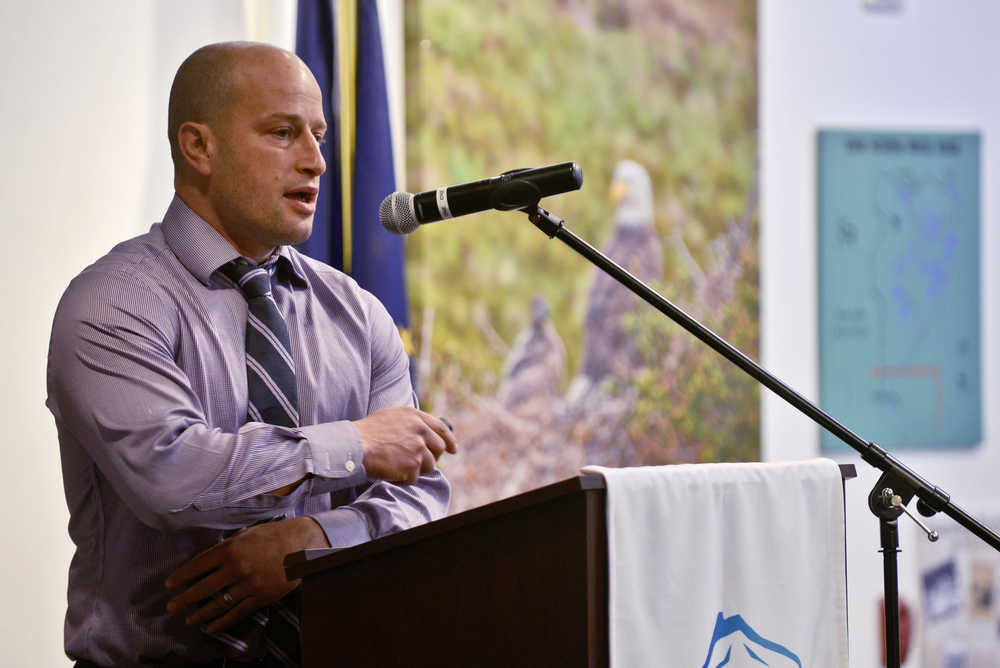With Kenai’s first legal marijuana retailer preparing for an announced opening next Monday, Kenai City Attorney Scott Bloom briefed attendees of a Wednesday Kenai Chamber of Commerce Luncheon on the present state of marijuana in the city.
Since Alaska legalized recreational marijuana in February 2015, marijuana-related criminal charges made against people in Kenai have fallen from 51 in 2014 to 16 in 2015, with seven so far this year, according to statistics Bloom presented from the Kenai Police Department. Most have been for underage consumption, Bloom said.
In the near future, Kenai could turn out to be one of the central Kenai Peninsula’s friendlier locations for marijuana entrepreneurs. Soldotna put a two-year moratorium on commercial marijuana in December 2015, and the Kenai Peninsula Borough will include a ballot measure in its October 2017 election to ban commercial marijuana outside cities, unless the borough assembly decides to hold a special election for the question sooner. In Kenai, the Planning and Zoning commission is able to permit marijuana retail in commercial, industrial, and central mixed-use zones, and cultivation in every zone except in central commercial, education, recreation, and townsite historic zones. Space is the greatest road block to marijuana establishments in the city.
“Our regulations on where a commercial marijuana business can be located are significantly more restrictive than the state’s,” Bloom said. “We’re able to be more restrictive than the state, but can’t be less.”
Kenai’s regulations build on the state’s by doubling state’s 500-foot minimum distance between marijuana businesses and schools, and by measuring this distance in a different way. The state measures setback distances by the shortest pedestrian route, while Kenai measures setback distances in straight lines.
Kenai planning and zoning commissioners have granted one of the two marijuana retail applications that local entrepreneurs have brought before them. The Red Run Cannabis Company, which got permission from the planning and zoning commission for a retail and cultivation facility in April 2016, is planning a Nov. 21 opening for its shop near the eastern edge of Kenai, in a strip of commercial zoning between the Kenai Spur Highway and the residential Thompson Park Subdivision. Among those opposing Red Run’s permit is Megan Green, who argued that homeschooling children made her nearby house an educational facility, requiring the 1,000-foot setback requirement.
The commission didn’t accept Green’s argument at the time, and Bloom said state-level rule-making has since invalidated it.
A second prospective marijuana business — the medically-oriented Majestic Gardens, which applied for a planning and zoning permit in June 2016 — was denied because of the 500-foot setback requirements. According to the planning and zoning commission’s June 22, 2016 meeting minutes, Majestic Garden’s prospective location is approximately 455 feet from the city-owned softball fields on Forest Drive — a recreational facility that triggers a 500-foot setback. Commissioners denied Majestic Gardens’ permit unanimously. Majestic Gardens’ prospective owners, Ron and Deniece Isaacs, appealed the decision. Kenai City Council members, acting as a board of adjustment, reached the same conclusion in denying the appeal.
Bloom said such issues are spurring some city council members to consider attempts to loosen the setback requirements.
“I think certain people who want to open up commercial marijuana businesses in the city are having a difficult time with location,” Bloom said. “It can be problematic, because we can’t tell you. If you come to the city and say, ‘Where can I put a marijuana business?’ we really have to look closely at it. Because we don’t really know where all the churches are, where all the substance abuse treatment facilities are, so it’s really a case-by-case basis, and we’re finding out that, at least in our downtown core area, there’s really not a lot of locations that will work.”
The Isaacs said they plan to reapply for the license at some point in the future.
Bloom named financial benefits Kenai can get from marijuana businesses: in addition to collecting the 3 percent city sales tax on product sold, he said the city also gets half of a marijuana business’ state license application fee. Kenai council member Bob Molloy, present at Wednesday’s luncheon, offered his reasoning on why Kenai hasn’t attempted to get additional revenue from commercial marijuana.
“In our tax system, all the taxes have to be collected by the borough,” Molloy said. “Your sales tax goes to the borough, and the borough counts it and sends the city their share. So you’d have to set up an administrative system to do that for a special tax, like an excise tax. But the cost of setting up and administering that system might exceed the revenue. We don’t know what revenue we’re actually going to get — we just have one store now and they said they have limited supply, so it’s going to take a while to see what the actual sales taxes from it are.”
Bloom said another reason to be wary of putting additional municipal revenue measures on Alaska’s nascent marijuana industry is that “the whole idea of this initiative is to bring it out of the black market, make legitimate businesses where consumers know what they’re getting and the state and local governments are getting tax revenue.”
“If you make it too expensive everybody’s just going to go back to the black market and buy it there instead of with these legal businesses that in some ways are having to compete with the black market,” Bloom said.
Reach Ben Boettger at ben.boettger@peninsulaclarion.com.

